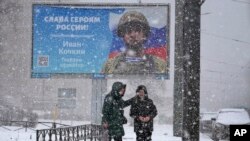The British defense ministry said Sunday that over the past two weeks, Russia has likely suffered its highest rate of casualties since the first week of its invasion of Ukraine nearly a year ago.
The ministry’s observation is based on Ukrainian data that Russia averaged 824 casualties a day over the last week, more than four times the average reported for June and July. The ministry said the statistics are based on “likely accurate” Ukrainian data.
The increase in Russian casualties, the ministry said, is “likely due” to several factors, including lack of trained personnel, coordination and resources at the front.
The U.K. intelligence update, posted on Twitter, also said Ukraine continues to experience a high attrition rate.
During his nightly video address Sunday, Ukrainian President Volodymyr Zelenskyy praised workers’ efforts to restore power systems damaged by drone and missile attacks by Russia on Friday.
Zelenskyy said most people had not had to face too many outages on Saturday and Sunday.
"The very fact that ... after a massive missile strike this week, we can have such peaceful energy days proves the professionalism of our energy workers," he said, according to Reuters. "We have to realize: this is not yet a decisive victory on the energy front. Unfortunately, there may be new terrorist attacks from Russia. There may be new restrictions if there is further destruction or growth in consumption."
Zelenskyy said scheduled energy outages would once again be in place when the working week started on Monday, Reuters reported.
Ongoing attacks
Meanwhile, Russia continued its bombardment of Ukraine over the weekend, shelling cities while trying to take more land in the eastern region of the country.
One person was killed and another wounded in the attack on Nikopol, a city in the southeastern Dnipropetrovsk region, Governor Serhii Lysak reported. The Russian attack damaged four residential buildings, a vocational school and a water treatment facility.
In Kharkiv, Ukraine’s second-largest city, one person was injured after three Russian S-300 missiles hit infrastructure facilities overnight, regional Gov. Oleh Syniehubov said. The Russian military said it hit armored vehicle assembly workshops at the Malyshev machinery plant in the city.
Ukraine’s military said it shot down five Russian drones over the partially occupied Zaporizhzhia and Donetsk regions Saturday night.
Despite the new Russian attacks, Ukraine’s military said Russian forces are having trouble mounting a wide offensive as the war nears the February 24 anniversary.
"They are having big problems with a big offensive," Oleksiy Danilov, the secretary of Ukraine's National Security and Defense Council, told Ukrainian television Saturday night.
"They have begun their offensive, they're just not saying they have, and our troops are repelling it very powerfully. The offensive that they planned is already gradually under way. But (it is) not the offensive they were counting on," Danilov said.
'Harsh realities' for Wagner group
Yevgeny Prigozhin, leader of the Russian paramilitary organization, the Wagner Group, predicted in a video interview Friday that Russia’s war against Ukraine could continue indefinitely. Prigozhin said it could take 18 months to two years for Russia to take full control of the Donbas region, Ukraine’s eastern industrial heartland.
Prigozhin said the war could then extend for three years if Moscow decides to attempt to capture broader territories east of the Dnieper River.
The British defense ministry said Saturday that data from the Russian Federal Penal Service suggested a drop-off in the rate of prisoner recruitment by the paramilitary group since December. It said news of the “harsh realities” of service in Wagner in Ukraine has probably “filtered through to inmates and reduced the number of volunteers."
The British ministry also said Russia is now facing a “difficult choice” of whether to continue “to deplete its forces, scale back objectives, or conduct a further form of mobilization.”
The General Staff of Ukraine’s Armed Forces reported Saturday that Moscow is strengthening its grouping of troops near Lyman and Bakhmut in the eastern Donetsk oblast, and Russian forces are continuing to focus their key efforts on offensive operations in the directions of Kupiansk, Lyman, Bakhmut, Avdiivka, and Novopavlovsk in Ukraine's east and northeast.
VOA's Eastern Europe Bureau Chief Myroslava Gongadze in Kyiv, Ukraine, VOA's National Security Correspondent Jeff Seldin in Washington and Ani Chkhikvadze of VOA’s Georgian Service contributed to this report. Some information came from The Associated Press and Reuters.
